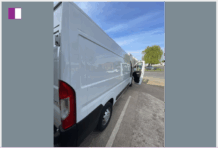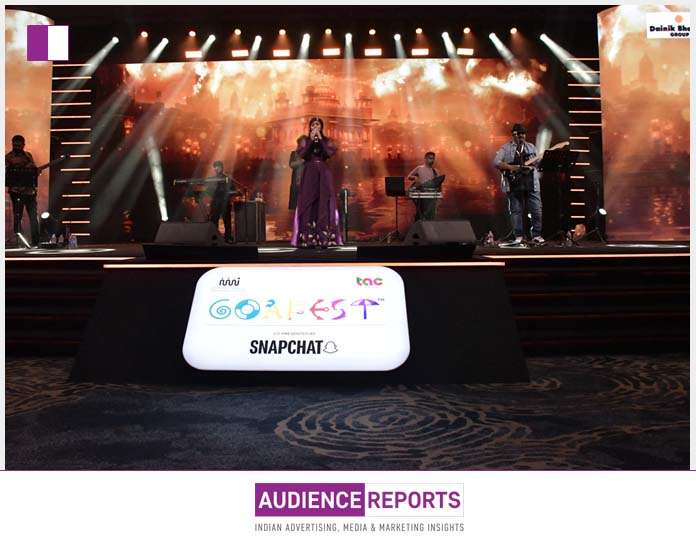Celebrating Adaptability: Highlights from Day 3 of Goafest 2024
May 31, 2024; National: A fresh wave of inspiration swept through the gathering as the curtains rose on Day 3 of Goafest 2024. From thought-provoking knowledge seminars to captivating presentations, the day unfolded with a tapestry of learnings, experiences, creativity, and innovation, embodying the vibrant essence of adaptability. In keeping with the vibrancy of the fest, the day began with a supercharged performance by Harshdeep Kaur, an Indian playback singer, presented by Spotify and powered by B4U Music.
After the captivating performance, the stage was set for a Knowledge Seminar presented by Femina, titled Indian Women Harnessing the Power Of Identity. This panel discussion, curated by Femina, aimed to deconstruct the evolving concepts of identity and narrative among Indian women. Among the esteemed panellists were Shilpa Rao, a renowned Indian Playback Singer, Alankrita Shrivastava, a Filmmaker, Tamannaah Bhatia, Actor; and Prajakta Koli, also known as MostlySane, a leading Content Creator, Actor, and Climate Activist. Guiding the conversation is Ambika Muttoo, Editor-In-Chief of Femina.
In this intensive and informative session, the panellists delved into the complexities surrounding the changing ideas of identity, portrayal and narrative, particularly as they pertained to Indian women. In this discussion about the burgeoning digital landscape, Prajakta underscored the unparalleled opportunities available today, stating, “There has never been a better time to be a pioneer in the digital space.” Highlighting India’s dominant position, she proudly proclaimed, “We are the biggest digital economy.” She also shed light on the critical role of consistency on digital platforms, underscoring its magical impact on success. Reflecting on this conversation, Ambika Muttoo said, “Cliches come from the truth,” reinforcing the timeless relevance of well-worn phrases in capturing genuine insights.
Tamannaah, known for her versatility across various industries and mediums, shared her unique approach to her career. “I didn’t confine myself to any identity. I didn’t put my thoughts and opinions in the way of myself. I want to be a medium and I find a lot of strength in that surrender,” she explained, showcasing her adaptability and open-mindedness. When Ambika inquired about the path to becoming a brand, Tamannaah offered valuable advice drawn from her extensive experience. “If you want to be a brand, you must learn to give first; this is what I have learned from all the brands that I work with,” she stated, highlighting the importance of generosity and contribution in establishing a strong, personal brand.

Through insightful discussions and personal anecdotes, they explored the multifaceted dimensions of identity, shedding light on the challenges and triumphs women face in navigating societal expectations and embracing their authentic selves. The session served as a platform for dialogue and reflection, inspiring audiences to reevaluate perceptions and celebrate the diverse narratives that shaped the identity of Indian women in today’s world.
A yet another insightful Knowledge Seminar was presented by Britannia, titled Secrets of Longevity: Adapting our lifestyles to increase our ‘Healthspan’ with Dr Marcus RannJey – Founder and CEO, Human Edge alongside moderator – Anupriya Acharya, CEO, Publicis Groupe, South Asia. Dr Marcus Ranney, a renowned longevity physician, highlighted the paradox of modern healthcare. “We’re living 19 years longer than what we were in the 1950s owing to many factors; however, even though we’re living longer, the problem with that is that we’re living sicker,” he remarked, underscoring a growing concern in public health. He also delineated the evolution of medical practice from era 1.0 to the current 3.0. “We’re moving from medicine era 1.0, to 2.0 and now we’re entering medicine 3.0 – preventive, proactive, personalised and participatory,” he explained. This new era of medicine focuses on preventing illness before it starts, actively engaging individuals in their health decisions, and tailoring treatments to individual needs.
He also spoke about the emerging field of biohacking, offering practical advice on mitigating the adverse effects of blue light exposure and promoting overall well-being. Additionally, he highlighted the importance of physical activity, suggesting that walking around 8,000 steps daily is ideal for maintaining good health. Dr Ranney’s insights provide a compelling vision for the future of healthcare, one that is preventive, proactive, personalised and participatory. This session delved into the secrets of longevity, exploring ways to adapt lifestyles for a healthier and more fulfilling ‘Healthspan.’ Attendees were treated to insights on wellness practices and lifestyle adjustments from Dr Marcus Ranney, while Anupriya Acharya guided the conversation, facilitating a dialogue on the importance of holistic health and its implications for individuals and society alike.
Following that, attendees were treated to a keynote address by WhatsApp titled Do More With Conversations, delivered by Gaurav Jeet Singh, Head of Agency Business, India, at Meta. “One billion people message with businesses every week,” he noted, illustrating the massive scale of this communication trend. Recognising the potential for more meaningful engagement, he revealed that WhatsApp is actively working to enhance the interactivity of these business exchanges.
Efforts by WhatsApp, including driving value, leads, sales and customer engagement among others aim to transform simple messages into rich, interactive experiences, fostering better customer service and more dynamic business relationships. Mr Singh also reinforced his claim with numerous anecdotes and examples from various brands. As this platform continues to evolve, such advancements are poised to significantly impact how businesses connect with their customers, enhancing both efficiency and user experience.
Day 3 of Goafest 2024 also witnessed the WARC masterclass on The Anatomy of Effectiveness presented by Sujeet Kulkarni, apprising the attendees on the incorporation of effectiveness in work and life. He began by asking the audience about their idea of effectiveness, after which, he defined it as having two components: “Advertising that delivers on its objectives, and advertising that delivers commercial returns,” – the latter point being especially important today. As the global authority on marketing effectiveness, WARC has designed five building blocks of effectiveness. The first block is investing for growth, second is balancing one’s spending, third planning for reach, the fourth, being creative, and the fifth building block is to plan for recognition.
Thereafter, the attendees witnessed an enriching masterclass by WhatsApp on Meta Creative Shop x WhatsApp: Getting Creative with Conversations, presented by Varun Goswami. He emphasised how quality and creative content could create a greater impact in helping brands grow. With over 600 million users, WhatsApp undeniably offers significant potential for brands. He discussed the platform’s exciting creative and branding opportunities, focusing on multidimensional storytelling that extends beyond messaging. He highlighted several tools that WhatsApp and Meta use, such as the AI companion, personalised content, advertisements, reels, feeds, stories, and more. Varun also discussed the importance of making the user experience fun, interactive, and meaningful, ensuring that it feels more human and encourages users to return.
Jo Jackson, CEO of D&AD, delivered a masterclass on Unpacking Brand Iconicity focusing on creating iconic brands and highlighting the rigorous standards of the D&AD awards, which attract 30,000 global entries. She emphasised D&AD’s commitment to nurturing talent through initiatives like D&AD New Blood and D&AD Shift, supporting creatives from underrepresented backgrounds. Jackson noted that 72% of 270 Shifters are now employed in creative roles, underscoring the “Win One, Teach One” mentorship ethos.
Jackson introduced ‘ownable iconicity’, where brands are identified solely through visual elements, demonstrated with a half-image activity featuring brands like McDonald’s and Oreo. Citing the Be Distinctive report, she stressed that only 15% of brand assets are truly distinctive. In 2025, $4.7 trillion will be spent on marketing, with 85% funding non-distinctive brand assets. The jury emphasised clarity in messaging for brand recognition, noting, “Iconicity is the key. To engage the audience, Jackson used QR codes to reveal the essence of brands like Lego and IKEA in three words, highlighting the importance of a brand’s essence in establishing its iconic status.
***
About The Advertising Club
The Advertising Club, incorporated in the year 1954, is arguably the biggest Advertising Club of its kind in the world. And according to many, it is also the busiest. It has over 1700 members drawn from media organisations, marketing companies, advertising agencies and allied professional bodies. The Advertising Club’s charter is to help raise the professional standards of the Indian Advertising Industry. The Club attempts to do this through awards, seminars, training workshops and meetings. Some of the major awards of Advertising Club include Creative & Media Abby at Goafest, EMVIEs, EFFIEs, MARQUEES and Young Achievers’ Awards besides having other popular programmes such as D:CODE – Digital Review, Ad Review, Media Review, M.Ad Quiz, Vice & Versa on its annual roller coaster. It publishes a Club magazine SOLUS and hosts a comprehensive website, www.theadvertisingclub.net.
About The Advertising Agencies Association of India (AAAI):
The Advertising Agencies Association of India (AAAI) is a not-for-profit, industry-led and industry-managed trade association of advertising agencies, formed in 1945, to promote their industry interests so that they continue to make an essential and ever-increasing contribution to the nation. The AAAI today is truly representative, with a large number of small, medium and large-sized agencies as its members, who together account for almost 80% of the
advertising business placed in the country.



































